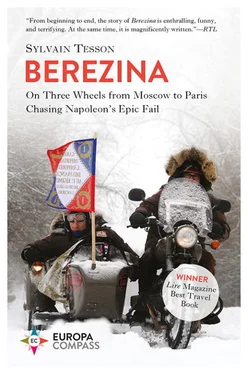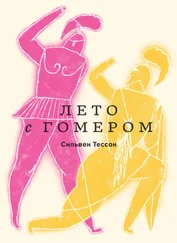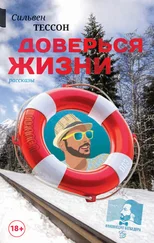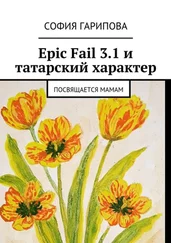We reached the border at 8 P.M. A line of trucks was stretching back from the customs post.
The first truck driver we asked—a Romanian—explained: “The bastards are on strike. Yesterday, the police threw some corrupt customs officers in jail, so the others have now closed their windows as a sign of protest.”
“How long has this been going on?”
“Two days.”
“How many miles is the line?” Vassily asked.
“Eleven miles and six hundred trucks,” the Romanian replied.
We drove up the line, at fifty miles an hour, along the emergency lane, brushing past trucks and praying to the border gods that a door might be opened to let us through, which would make everything quicker. What did Vassily say to the Belarus female guard beautifully dressed in a khaki uniform? She gave our party a look of contempt. Had Belarus customs officers received instructions not to stop Urals from clearing off the land? Three minutes later, we were on the other side, in the European Union, on Lithuanian soil, separated from Vilnius by thirty miles of asphalt so smooth that Vitaly exclaimed, “Funny, as soon as you’re in the European Union, there’s less mud!” In the city center, everything suggested that the country had been multiplying its efforts for the last twenty years to meet EU standards. The well-stocked shops, spruce streets, Christmas decorations, German cars, and people wearing cool clothes on sidewalks cleared of snow were in contrast with the construction site atmosphere, factory architecture, steel industry aesthetics, and depressive inhabitants of the former USSR cities. In a Brussels-standard brewery—waitresses with piercings, sushi, and World Music—Vitaly carried on with his theories. “Before, Lithuania was part of our Empire, and now it’s in your Union.” We seemed to have come out of a night of suffering and the forests from hell, in order to enter, head low, the Disneyland staff canteen. We looked around at these pleasant, pink people who were waiting for Friday to finish off a week at the bank with a weekend of leisure.
We’d been so cold in the past few hours, since Berezina, that we decided to warm ourselves up with peppered vodka. The first bottle in memory of the French, the second in memory of the Russians, and a few extra glasses for the Polish, British, and German auxiliaries of both Empires. And, if that night we went to bed at not too ungodly an hour, it was because we’d developed the ways of drunks, and the bar manager threw us out after, in between bellows, we’d set fire to the tablecloth by knocking over the candles on our table.
DAY SIX.
FROM VILNIUS TO AUGUSTÓW
This morning, war council over four pints of black coffee aimed at knocking out our hangover. Gras was leaving us and we were sad about it. We liked the way he read Labaume or François’s Memoirs in the Ural sidecar, indifferent to the cold, as though comfortably seated in the armchair of the Geographical Society in Saint Petersburg. He had commitments in Donetsk. Ukraine hadn’t yet exploded through the impetus of democrats and new philosophers. He jumped onto the morning Vilnius-Kiev after telling us off.
“What shall we do, guys?” Goisque asked.
“We can either follow the route of the retreat toward the Neman and Kœnigsmark, or that of the Emperor, as far as Paris, through Warsaw,” I said.
“Don’t you think your ‘Corsican king’ went a bit far, abandoning his men like that?” Vitaly said.
“It’s more complicated than that,” I said.
“That’s what people always say when they’re in a bit of a jam.”
The secret of his departure from Smorgon had been well kept. When the soldiers discovered that the Emperor had left them, there was overwhelming consternation. The sun had withdrawn from their sky. Did the astonishment turn to reproach? Labaume talks of the men’s “legitimate” indignation. Bourgogne, on the other hand, doesn’t seem to hold it against his chief. Perhaps the men were too busy looking for carrion to sink their teeth into to get lost in curses. When one is trying to escape from death, is there any energy left to subject somebody to public scorn?
Besides, should Napoleon be disowned? Isn’t the role of an admiral to look after the fate of his fleet rather than to die in the shipwreck of one of his vessels? That’s what I was trying to explain to Vitaly in Russian.
The Emperor was the cement that kept the debris of the army together. His magnetism bound the officers. His energy galvanized soldiers. The certainty of his presence, albeit invisible, inspired everybody to stand up and acquire some of the general glory. Once the sovereign had gone, everything could fall apart. And it did fall apart. And there was nothing Murat could do to prevent dereliction. The army dragged itself along, attracted by the prospect of Vilnius. Like in Smolensk, a few weeks earlier, the human wreckage needed a mirage. And, just like Smolensk, Vilnius turned out to be far from expectations.
It was a horde of human skeletons that crowded the gates at Vilnius on December 8th. Forty thousand hungry men swooped on a slumbering town that knew nothing of the rout. When the burghers saw this stream of godforsaken men covered in animal skins, they did exactly what burghers do when they feel threatened: they closed the city gates.
The tide of zombies smashed against the ramparts. “This chaos reminded me of Berezina,” Labaume writes. Marshal Davout had to climb a ladder in order to enter the city through hidden gardens. The pack ended up forcing the gates and penetrating the square, but only to find no aid there. The absence of command prevented the distribution of supplies even though there was enough to feed an army. Overly zealous officials refused to start emergency distribution, and demanded “distribution coupons” from the wretches who were begging for a crust of bread. Can you imagine dying men reaching the threshold of their salvation only to be refused help by the very people who were supposed to provide it? Forty-eight hours later, this treasure of bread and meat fell into the hands of the Russians.
The rebuffed soldiers wandered down the streets of the city, hoping only to glean some warmth and food by a kind stroke of fate. They were returning from the far ends of life and were being refused entry into homes that exhaled the smell of freshly-baked bread. The residents had barricaded themselves in. And death took its toll on more soldiers on the sidewalks where the wind blew at -4°F. If Vilnius escaped total sacking, it was because the men were drained of strength. Berthier’s admission on the morning of November 9th fell like a funeral oration: “Sire, I must be truthful and tell you that the army is in a total rout.”
As early as the 9th, a Cossack vanguard approached the city. The bulk of Kutuzov’s troops was two or three walking days behind. Prince Murat, eager to ensure a way out for himself, fled the city in the evening, and headed straight west, toward Kaunas. And the Grande Armée evacuated the city in the darkness. On the 10th, no sooner had Ney’s rear guard escaped from Vilnius than the Cossacks galloped into the capital with their war cries.
By the time Kutuzov entered Vilnius on December 12th, he had completed his mission: that of chasing the hydra off Russian territory. The city gates were those of a burial vault. There reigned a putrid smell. Twenty thousand stragglers of the Grande Armée hadn’t had the strength to leave the place, and were waiting to die, bullied by the Cossacks and tortured by the cold. In the monastery of Saint Basil, there were about eight thousand dead heaped in the corridors. The windows were blocked by stacks of corpses. When he remembered “seeing a group of four men, with frozen hands and legs but their minds still alert, with dogs devouring their feet,” the British general Robert Thomas Wilson, Kutuzov’s advisor, said, “One must envy the dead.”
Читать дальше












